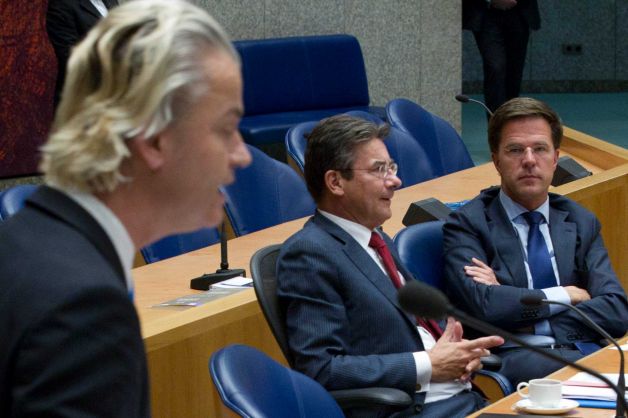Dutch whitewashers and distorters of the Holocaust
Published today at YNET, this article by Dr.Manfred Gerstenfeld focuses on the extreme contradictions in Dutch Holocaust memory in the Netherlands. It also has a miniscule change from the article posted on Ynet this morning, as well as including of footnotes.
NOTE: Anyone wishing to see Dr.Gerstenfeld’s new pulications, head on over to his Facebook page and give it a ‘like’ as well.
Prime Minister Rutte best embodies the ignorance and ambiguity of many authorities. At the beginning of this year, the continued lack of an apology for the Dutch wartime government’s almost total disinterest in the fate of the Dutch Jews became a public issue. Two Freedom Party parliamentarians, Geert Wilders and Raymond de Roon, submitted questions on this matter to the Prime Minister. Rutte refused to apologize. The reasons he gave were entirely irrelevant to the questions he was asked.
The Holocaust as a Memory Battlefield 8 May 2012
Manfred Gerstenfeld
There are few societies where the contradiction between Holocaust distortion and Holocaust commemoration is as major as in The Netherlands. This phenomenon came to the fore again last week on National Memorial Day, the 4th of May, which is designated to commemorate the many victims of the German occupier. One hundred thousand Dutch Jews – more than 70 percent of its pre-war community – were by far the largest group of victims.
The small town of Vorden decided that those participating in the ceremony for Dutch victims could also jointly visit the graves of German soldiers who are buried there. Originally it was intended that the local choir would sing a German song at the graves. That part of the program was soon scrapped.1 A Jewish organization went to court and obtained an injunction which forbade the mayor – who is a main proponent of whitewashing the war past – to participate in the visit to the German graves. A number of Jews hired a small plane which flew over the town with a banner reading: “Vorden Went Wrong.”
In a widely spread press release, the Simon Wiesenthal Center denounced the Vorden authorities. It expressed the essence of their abuse of history: “By honoring the German soldiers who occupied the Netherlands on behalf of the most murderous regime in human history and supported the occupation which helped implement the mass murder of Dutch Jewry, the local authorities of Vorden have basically rewritten the history of the war, erasing the critical distinction between victims and perpetrators. Such a decision is apparently based on the erroneous assumption that forgiveness automatically leads to reconciliation, ignores the horrific nature of the Nazi regime and is an insult to its victims.” In addition, one might observe that the current peaceful coexistence between countries in Europe doesn’t require falsifying history.
The Vorden incident did not stand alone. The National Committee for Commemoration chose a 15 year old boy to read his poem at the National Ceremony in Amsterdam. It commemorated his uncle, after whom he was named, who had joined the Waffen SS. After protests, this reading was cancelled.
Dutch whitewashers and distorters of the Holocaust and the Second World War come from different backgrounds. A number of them are family members of those Dutch who collaborated with Nazi Germany. The Netherlands had 25,000 Waffen SS volunteers, the largest contingent in Western Europe. There were many other collaborators. These were not limited to members of the Dutch Nazi party. Others are those who falsely believe that except for Hitler and a limited group of fanatics, all other Germans were victims too.
Another issue concerns the defacing of Holocaust and other Jewish sites.2 Swastikas are also painted elsewhere.3 Until 2010, anti-Semitic postings on internet sites were the largest group of hate postings in Dutch. One finds Holocaust denial talkbacks on the web, even in prominent mainstream papers. Dutch Prime Minister Marc Rutte, who was educated as an historian once said while he was the parliamentary leader of the liberal faction, that Holocaust denial should not be punished.4 This raised objections in his party.5
On the other hand, it is difficult to find another country where so much attention is given to commemorating its destroyed Jewish communities. Many municipalities clean and maintain Jewish cemeteries on a regular basis. Some organizations and individuals even re-erect fallen gravestones and repaint the lettering. Not only are there monuments for the murdered Jews in many towns, there are even plans for new ones.6Memorial ‘stumbling” stones embedded in pavements in front of homes where Jews lived before their deaths have been placed in tens of towns and more are planned for the future.
Jewish monuments are “adopted” and cleaned by schoolchildren in some towns. Many synagogues which were no longer in use after the Second World War have been restored in past decades and serve as cultural centers and the like. A few even host Jewish services. There are many other annual memorial activities.
Prime Minister Rutte best embodies the ignorance and ambiguity of many authorities. At the beginning of this year, the continued lack of an apology for the Dutch wartime government’s almost total disinterest in the fate of the Dutch Jews became a public issue. Two Freedom Party parliamentarians, Geert Wilders and Raymond de Roon, submitted questions on this matter to the Prime Minister. Rutte refused to apologize. The reasons he gave were entirely irrelevant to the questions he was asked.
Thus the Netherlands, in its refusal to acknowledge the wartime misconduct of its authorities, remains far behind all other Western European governments. Much of what has been described above exists in other countries as well, but nowhere can it be analyzed as clearly as in the Netherlands.
2 “Hakenkruis op Joodse Poortje”, De Weekkrant, 25 April 2012. [[Dutch]
“Joods gedenkbord in Druten bekrast,” Gelderlander, 26 April 2012. [Dutch]

